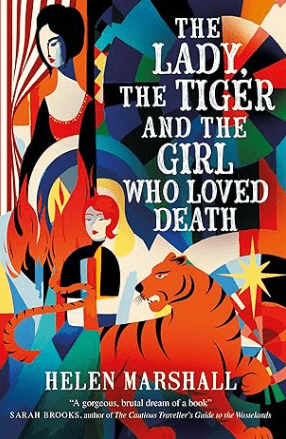
For all things fantasy, horror, and speculative fiction

Review Details
Review type: Book
Title: The Lady, the Tiger and the Girl Who Loved Death
Author: Helen Marshall
Publisher: Titan
Release date: 10th June 2025

Reviewed by: Rym Kechacha
Other details: Paperback RRP £9.99
The Lady, the Tiger and the Girl Who Loved Death by Helen Marshall
Book Review
Rym Kechacha
The young Sara Sidova is escaping from the soldiers who have killed her husband when she is shot. In the moments before she knows if she will live or die, she is given an extraordinary gift; to see into her future and be told a story of what will come to be by her own granddaughter. Suspended in a time outside time in the company of an Evening Star, which I took to be a spirit of the future, a Morning Star, which I took to be a spirit of the past, and Amba the tiger, a spirit of creation and destruction at the core of the universe. Sara Sidova listens as Irenda, her granddaughter, tells us of how she ends up as a circus performer, first as the tiger handler and then as the ring-mistress, eventually to enact a complex and hard-won revenge.
It’s narratively complex and loops back on itself, and while I was swept away by both the stories of Sara Sidova and her granddaughter Irenda, I had to work at creating the links with the Stars and Amba the tiger. The novel has its own dream-world logic, but it is always rooted in the stories of these two women, their circuses and their losses, which mirror those of these long centuries of repression, war and displacement.
The novel has a vagueness about the political situation of the country, which took me a while to get used to. It’s set in a fictional country called Strana which seems to be Eastern Europe because of the names of the characters and the references to Baba Yaga, could perhaps be Russia but really is anywhere with forests and little villages and big stone-bound cities that swallow up the surrounding country.
Marshall gives us little of the historical or political context that leads to the novel’s opening; a heavily pregnant Sara Sidova trying to escape soldiers through a forest. This fable-like lack of detail is evocative of the way ordinary people experience war, political repression and military rule; a chaotic jumble of arbitrary rules, checkpoints, shortages and the occasional explosion of violence that tightens the military’s grip. Questions are unanswerable and pointless. How did this man come to be so powerful? We have forgotten now. What will happen when he dies? Things will largely be the same. Who are the garrisons of soldiers fighting for or against? It doesn’t matter. Marshall creates this forbidding, grey backdrop to contrast with the light, fire and magic of the circus.
Marshall’s writing about the animal sensuality of the circus tigers is beautiful, and the creature becomes a glowing mystery at the centre of the novel, never controlled or controllable. ‘His body moved like fire … eyes golden as polished stones, the pupils dark as oil drops.’ I loved the way Marshall writes about performance, especially that feeling of being held in the beam of an artist’s stage charisma, which is a major driver of the magic in the story.
The circus as pure spectacle of human ingenuity and potential; the can-they-do-it-will-they-do-it, heart-in-your-mouth, I-hope-it-doesn’t-go-wrong feelings as the performer leaps towards the trapeze or throws the knife. That’s what you pay your money for. Or really, Marshall shows us, what you pay for is those seconds before you know they’re safe when you understand that the performer is a human, just like you, and if they can do something as extraordinary as that then perhaps a tiny fragment of that brilliance might reflect back onto you.
The entire novel takes place in the space of the few heartbeats before death, which are perhaps the same as those heartbeats before the acrobat or the juggler defies death and brings us with them. I found the tension between the sprawling story of some years and the few moments it was told in very compelling.
Storytelling is a major theme of the novel, the kinds of stories that are fluid and have no truth you can readily access. The whole novel feels like a human story wrapped inside a bright myth, which I loved. The feeling of the humans operating within history and the cosmological beings operating within deep story time is very rich. This novel is for you if you like stories that know themselves to be stories; if you like to ponder the ways in which we can and do resist oppression; if you like Slavic-inspired fantasy; and if you like tiger and circuses and beautiful writing then you should jump on it straight away.
Tags: DystopianFairy TalesFantasySlavicTitan Books
Category: Book Review
All reviews
Latest Reviews:
- The Human Chord by Algernon Blackwood
- The Fog by James Herbert
- A Palace Near The Wind by Ai Jiang
- Extremity by Nicholas Binge
- Girl Dinner by Olivie Blake
- The Swan’s Daughter by Roshani Chokshi
- Out of the Past, Tales of Haunting History edited by Aaron Worth
- Witchborne by Rachel Grosvenor
- Shattered Reality . Call of Cthulhu Scenario Anthology
- The Flesh King by Richard Kadrey
Review tags:
Action (48) Adventure (69) Angry Robot Books (11) Contemporary Fantasy (15) Fantasy (116) Gothic Horror (12) Harper Voyager (12) Historical Fantasy (14) Hodderscape (11) Horror (73) Orbit Books (33) Romance (28) Science Fiction (35) Titan Books (36) TorDotCom (12)
Leave a Reply